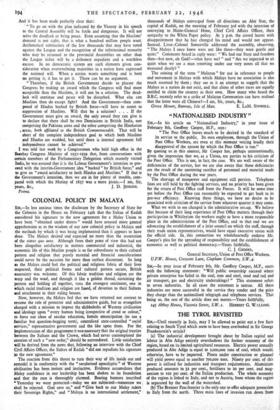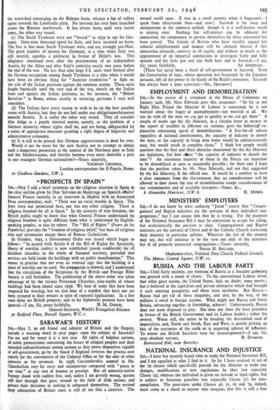THE TYROL REVISITED
SrR,—Until recently in Italy, may I be allowed to point out a few facts relating to South Tyrol which seem to have been overlooked in Sir George Frankenstein's article?
(a) The industrial development brought about by Italian capital and labour in Alto Adige entirely overshadows the former economy of the region, based on its limited agricultural resources. Electric power annually produced in Alto Adige is. equal to 2,00o,000 tons of coal, which would, otherwise, have to be imported. Plants under construction or planned will yield power equal to another 7130,000 tons. Ninety per cent. of this power is utilised for industries and transport requirements. Aluminium produced amounts to 32 per cent., fertilisers to 20 per cent. and mag- nesium to roo per cent. of the Italian production. The whole economy of the region is linked to Italy, and not to Austria, from whom the region is separated by the wall of the watershed.
(13) The Brenner Pass frontier is the only one to offer adequate protection to Italy from the north. Three main lines of invasion run down from the watershed converging on the Bolzano basin, whence a fan of valleys opens towards the Lombardia plain. No invasion has ever been launched across the Brenner northwards. It has always been,- until very recent times, the other way round.
(c) The South Tyroleans were not " forced " in 1939 to opt for Ger- many. Sixty-nine thousand opted for Italy, and have incurred no harm. The fact is that most South Tyroleans were, and are, strongly pro-Nazi. The great number of optants for Germany, at a time when Italy was still neutral, signifies a plebiscite in. favour of Hitler's war. This allegiance continued even after the proclamation of an independent Austria by the Allies and after Italy's armistice nearly two years before the end of the war. No less than nine large S.S. units were formed after the German occupation among South Tyroleans at a time when it would have been an obvious thing for " Austrian irredentists " to fight on the side of the Italian partisans against the common enemy. These units fought fanatically until the very end of the war, mostly on the Italian front and against the Italian partisans, as, for instance, the "Bolzen Battalion " in Rome, whose cruelty in torturing partisans I very well remember.
(d) The Italians have every reason to wish to be on the best possible terms with Austria, but they do not feel under any obligationbwhatsoever towards Austria. It is rather the other way round. They all consider Alto Adige as a purely internal matter, namely, as the problem of a German minority, whose rights shall be, and are being, safeguarded by a series of appropriate measures granting a right degree of linguistic and administrative autonomy.
(e) It is still to be proved that German aggressiveness is dead for ever.
Would it not be wiser for the new Austria not to attempt to obtain such a dangerous possession as the control of the Northern door to Italy and the Mediterranean, and thereby become even more desirable a prey to any resurgent German nationalism?—Yours sincerely, VINCENZO CECCHINI, London correspondent for II Po polo, Rome. zo Gledhow Gardens, S.W. 5.































 Previous page
Previous page